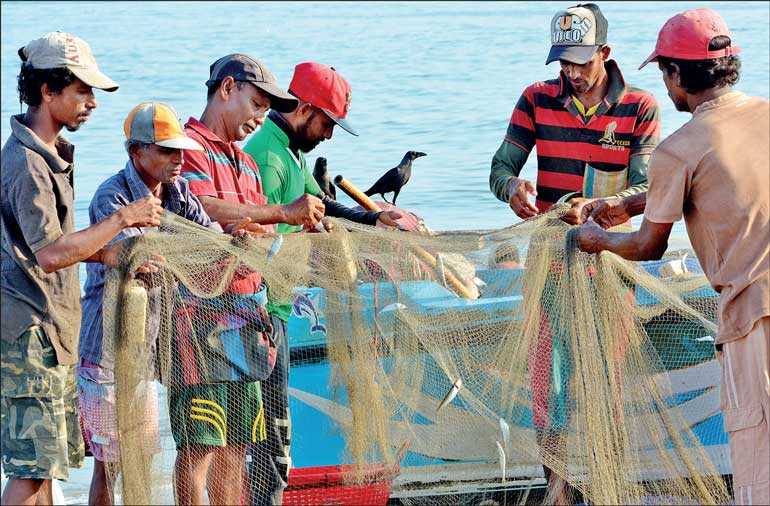Monday Feb 16, 2026
Monday Feb 16, 2026
Friday, 27 November 2020 00:00 - - {{hitsCtrl.values.hits}}

Better strategies are needed to enable a better life for Sri Lanka’s farmers, fishermen and estate workers – Pic by Shehan Gunasekara
By Fr. Emmanuel Fernando, OMI
1. The farmers
There are two main problems which affect the livelihood of many farming families in the North Central Province (NCP) of Sri Lanka, namely rural indebtedness and the Chronic Kidney Disease (CKD).
The farmers need a fair price for their produce. But floods and droughts cause poverty of the farmers not only in the NCP but also in other provinces where people eke out their existence out of farming. When they have a good harvest, they generally spend the money lavishly on consumer goods expecting abundance during the next harvest. But nature decides otherwise. Hence the farmers are compelled to pawn their jewellery and/or borrow money from the money-lenders and from the banks and pay the interest.
Rural indebtedness has become a major economic problem among the farmers. It has got institutionalised. Therefore there is an urgent need to educate the farmers so that they too liberate themselves from this institutionalised way of life and provide hope for their children for better quality of life. In this endeavour, the government can also provide opportunities and facilities by appointing competent officers to create awareness of the problems and find suitable solutions by organising thrift societies.
Medical research has shown that many families engaged in cultivation in the NCP have become victims of CKD. A survey conducted in the schools had discovered that 10% of the 5,000 school children are suffering due to CKD in the District of Anuradhapura. This disease has been caused by excessive use of chemical fertilisers, pesticides and weedicides for the cultivation of paddy, vegetables and fruits during the past several years and also through occupational exposure of the agricultural communities to herbicides. Non-availability of safe water for drinking and for the preparation of food is one of the main problems affecting vast majority of the people living in the NCP.
Dialysis is given to kidney patients in the hospitals but many patients are unable to find money to obtain this help due to poverty. Many families therefore are compelled to pawn their jewellery and mortgage their property.
2. The fishermen
The continuous intrusion of the South Indian fishermen into Sri Lankan waters, crossing the international Maritime Boundary Line (IMBL), using Illegal, Unreported and Unregulated (IUU) fishing methods, especially hi-tech bottom trawling which comb our sea bed, destroying also our marine resources and fishing gear of our Sri Lankan fishermen, goes on undeterred. Bilateral meetings at the highest level between Sri Lanka and India have been held several times but to date, the issue remains unresolved.
Our fishermen feel powerless to resist or prevent the movement of more than 300 big Indian trawlers poaching as close as 500 meters to our coastline. As a result, our Sri Lankan fisher-families, especially in the Northern Province, are made to suffer the consequences. Some have become unemployed or under-employed and they are unable also to assure quality education for their children. In this situation, they are compelled to pawn their jewellery to buy nets destroyed by the Indian trawlers and to educate their children.
Already in 2013, Bishop Rayappu Joseph had said: “Our fishermen have done all they can to urge the government to take action against this blatant robbery of our livelihood. They have taken a defiant stand against poaching by the Indians but to no avail. He said he had even raised this matter on numerous occasions at the Bishops’ Conference.” (Daily Mirror, 12 Oct. 2013).
Fisheries Minister Douglas Devananda who hails from the Northern Province of Sri Lanka has already understood the plight of the fisher-families in the north and has said that a joint mechanism has been proposed to address the issue. I hope he will be able to arrive at a just solution on behalf of our fisher-families and our country without procrastinating.
The closure of the Peliyagoda Fish Market, the Sri Lanka’s main fish market, following a fresh cluster of COVID-19 virus and secondly the falsely spreading news that virus can be contracted through eating fish had affected the fishing industry and the fisher-families. It has also affected the companies and the individuals who export fish and the poor fish vendors.
3. The estate workers
The estate workers need to improve their physical quality of life (PQL) in order to be healthy human beings and continue to toil and contribute to the Gross National Product (GNP) of Sri Lanka. Such a desired goal cannot be achieved right now with their meagre earnings (Rs. 750 per day).
As reported in the Editorial of Daily Mirror on 14 October, quoting UNICEF, more than 40% of children under the age of five on the estates are stunted. Under-nourishment will cause sickness and sicknesses will cause deaths. To get over this vicious circle, the Government must raise the daily wage of every tea estate worker, not forgetting their untiring efforts which account for 12 % of the total export earnings of Sri Lanka (Daily Mirror, 13 November). Prime Minister Mahinda Rajapaksa in his Budget speech has proposed a daily wage of Rs. 1,000 for estate workers from January 2021.
Every tea estate worker and his/her family have also an inalienable right to lead a life worthy of human dignity and in solidarity with other people in Sri Lanka. For this purpose, the tea estate worker needs a family wage, better housing, sanitary and medical facilities. The children need quality education in order to feel socially esteemed, be better integrated in Sri Lankan society and contribute to its progress. For this purpose, the trade unions and other welfare organisations must continue to find better strategies in order to enable the tea estate workers to become also architects of their own progress.